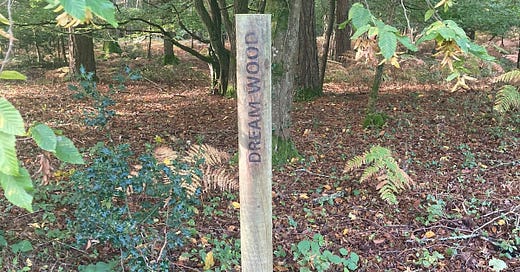Cultivating Wildness Retreat in Hazel Hill Woods
Cultivating Wildness in ourselves and in our organisations at Hazel Hill Woods
Written by Eloise Clarke
In October 2023, Patrick Andrews (the Barefoot Lawyer) — who is a friend and collaborator of Moral Imaginations — invited us to his first retreat exploring the cultivation of wildness in ourselves and in our organisations. Phoebe co-hosted this gathering by leading the group in exploring our radical interconnection with all life using a process inspired by an Interspecies Council in the woods. This is a short taster of more-than-human connection. Nine of us gathered amongst the woods for this two day retreat that made space for deep listening, reflection, insight, imagination and connection. It was an opportunity for kindred spirits to gather together, to acknowledge our own inner wildness, share stories and embrace time in nature around the campfire.
Dream Wood
The expertise of those that gathered ranged from law, education, finance, management, all of whom were already on this journey of social and environmental work. The first day explored what we could learn from nature, immersing ourselves in the woods and the natural abundant systems that operate within it. We were invited to take time for quiet contemplation as we walked silently through the woodland and in time allowed ourselves to share thoughts that came to us organically. Thich Naht Hahn’s words on interconnection were shared as we stood amongst trees in the warm sunshine; from that we explored our thoughts and what this brought up in each of us. Space was given for us to take time alone in the woods, after which we reconvened for lunch and open discussion on our own work and experiences.
Learning from nature to guide organisational purpose and governance
With Patrick’s guidance, we explored the concept of an organisation’s purpose and the conflicting nature of the role of a CEO/company manager and the interlinking ebb and flow of an organisation’s stakeholders. Company boundaries were drawn and the potential impact of shareholders’ grasp on it and the subsequent effect they can have on its purpose were imagined and discussed. Hypothetical ideas were explored around the potential systems and processes within organisations and what could be learnt from nature to cultivate an egalitarian organisation where all parties, including nature, are considered and nurtured.
Holding this work amongst the trees had a profound impact on one’s thoughts and ideas, ensuring the consideration for the more-than-human world was ever present. This ignited a true need for the consideration of nature within decision making, acknowledging the need for it to have a voice and a seat at every table as decisions are made. The group explored the idea of organisations appointing a steward for Nature. This steward would collaborate and hold to account senior management. A system of individual and mutual responsibility and obligation were explored alongside the consideration of the distribution and balance of power. Patrick’s session certainly opened up new viewpoints and allowed us to explore alternative approaches to business and to traditional systems.
Inviting more-than-human perspectives and empathy into governance and organisations
Around the woodland campfire that afternoon, Phoebe led us through an exploration into our own connection with nature. With Phoebe’s guidance we were asked to consider nature and connect with it by opening up our human consciousness and inviting in the web of life, be that wildlife, flora, fauna, river, mountain; an element of the natural world.
Once our more-than-human selves were found, we were encouraged to explore the space in our new roles, connecting with the woodland space, adjusting to how this environment felt through the eyes of our more-than-human selves. Then we gathered as a group around the fire to hold Hazel Hills first Interspecies Council. Amongst us were cow, wasp, mycelium, tick, mountain, crocodile, duck, fox and deer. Together there were discussions of what humans have done to this earth and what they need to realise and do to make change.
This exercise of moral imagining — stretching our minds eye to our more-than-human selves allowed us to connect deeply with the natural world, creating many different perspectives, sharing our experiences and findings. And shifting our human viewpoints to those with much less power in the face of our planet’s fate. This enabled us to consider our own individual actions and impacts on nature as well as the worldwide responsibilities of the human race to protect nature and the environment. Ultimately, giving nature a platform and a voice pushing us to make change for all.
From the Interspecies Council, themes arose. We implored the human race to seriously consider the consequences of their actions. We asked them to let go of their hold on the world, giving back to the earth. We requested the development and understanding of the interconnections between all of the natural world and humans, encouraging integration and for humans to recognise our need to work in symbiosis. Many spoke of hope and our belief that the human race still has the power to make the changes that are needed, provided they can let go of systems that do not serve them or us. That they can accept the cyclical nature of life and death, of give and take and their role within the earth's cycles. There was discussion around the many opportunities for humans to reconnect and live amongst and with nature rather than rejecting and neglecting us. We asked for their respect, for them to reconnect with us and for us, letting go of excess and ego. Instead acting with compassion and humility.
This experience was an inspiring one that allowed all of the opportunity to explore new perspectives and share new imaginings. I myself left the wood feeling inspired and empowered to build a better future both for myself and for all beings.
— Written by Eloise Clarke
If you are interested in hosting an Interspecies Council at your event or organisation, please get in touch at phoebe@moralimaginations.com.
Campfire at the centre of the Interspecies Council





